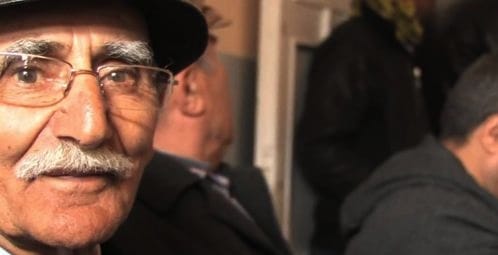 Democracy: A political system defined by the vote of the people and the service of elected representatives whose main duty is to meet the expectations of their populace. At least in an ideal world this would be true. Countries all around the world use and abuse this political system on all levels, from national to local leadership and councils. Caner Canerik’s documentary Muxtar (Village Headman) gives the audience a window through which to view the tainted practices of village campaigns in Turkey and traces the trickle-down source of the corruption from politicking at the higher levels. The film also acts as a mirror, reflecting back to us the corruption, infighting and farce of political campaigns everywhere.
Democracy: A political system defined by the vote of the people and the service of elected representatives whose main duty is to meet the expectations of their populace. At least in an ideal world this would be true. Countries all around the world use and abuse this political system on all levels, from national to local leadership and councils. Caner Canerik’s documentary Muxtar (Village Headman) gives the audience a window through which to view the tainted practices of village campaigns in Turkey and traces the trickle-down source of the corruption from politicking at the higher levels. The film also acts as a mirror, reflecting back to us the corruption, infighting and farce of political campaigns everywhere.
Dersim village faces many basic problems; the local governance seems to have forgotten their plight while they continue to live in the 21st century without the basic necessities of electricity, running water and useable roads. Under these conditions the young people escape to the cities or mountains, and many neighbors abandon their homes to the elements in search of better opportunities in larger cities or even abroad. Dersim and its surrounding hamlets are left with ageing populations and having to make-do in challenging circumstances.
Upon this scene enters the muhtar (village headman) election season, when the candidates try to convince the different members of the local electorate, mainly relatives and in-laws, that they deserve to be the leader of the village. Ahmet Canerik, the incumbent muhtar, and two other candidates swear that they are the ones, this time, who will really take action. They promise to be the aggressive leader who will force the governor to take notice of their situation, even if it’s necessary to tear up his shirt, as Ahmet Bey himself explains. Over and over again they vow that their motivation to run is the desire to serve the people, not the regular paycheck which will go into the winner’s pocket for five years.
What follows is a comedic and poignant perspective into the gossiping, canvasing of distant family members and bribery in the years leading up to election day. Ahmet, the central character in the story, asks his close family members to call other relatives and their spouses and tell them to cast their ballot for his camp. The film also interviews a selection of the villagers for their views on the candidates, as the 50 odd voters swing from camp to camp, promising to one and then the other. In this political climate, flags and posters are put up and taken down as quickly as the varying party representatives pass through the village.
Here the history of Dersim village and the traditions of Kurdish and Alevi culture play an important role in daily life and the complex politics of the region. The people want to keep their tribal and villager cultures alive, bring people back to the mountainous beauty of their area and guard the peace, but at the same time desire the basic infrastructures of modern life. The theme of isolation from this modernity runs throughout the film. Fancy campaign vehicles make pit stops in the village to hear grievances and make empty promises, an airplane passes high overhead to distant destinations while for those below a trip to Ankara would be a big deal, and a new car honks at a village woman trying to get water to her home by wheelbarrow from the nearest source. There is a clear stratified line between the haves and have-nots. Even between brothers the line is drawn. As Ahmet Bey explains, he has a saw so old that it had to be fixed with wire, while his brother lives well in Germany and offers only his advice.
Canerik succeeds in producing a documentary balancing the comedy of the strong personalities of Dersim clashing and the complexity of the political situation of the region. The villagers don’t feel sorry for themselves and ask for no pity, but the audience takes away a better understanding of the people in this area of Turkey.
Muxtar played at !f, the 14th Annual International Independent Film Festival, on February 13th. The festival will continue until February 22nd.
Meridith Paterson is a contributor to Yabangee










